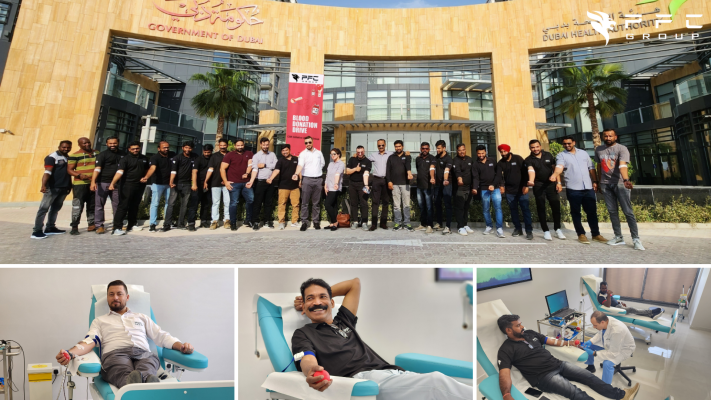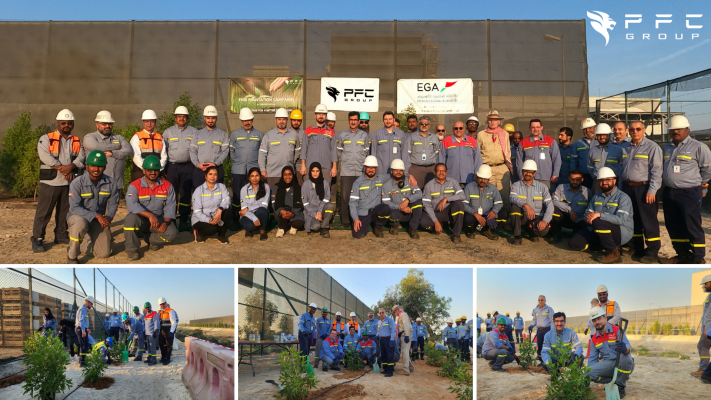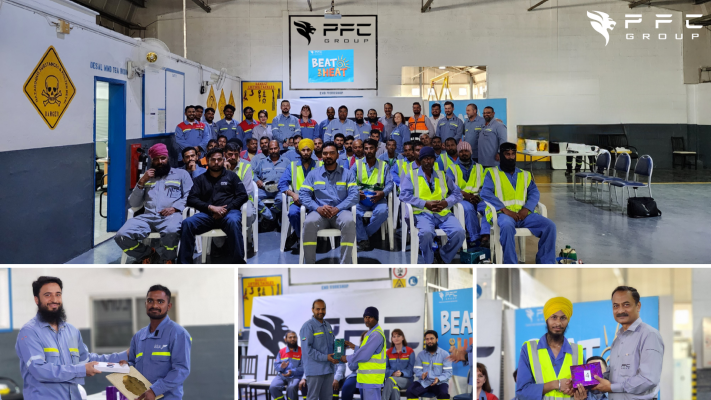Corporate Social Responsibility (CSR) and safety are integral to the construction industry, influencing not only the well-being of employees but also the sustainability of communities and the environment. Companies in the UAE have increasingly recognized the importance of these elements, incorporating them into their core business strategies. This shift towards responsible and safe practices not only enhances their reputation but also ensures compliance with stringent regulatory standards.
Liyon Jose, the Health, Safety, and Environmental (HSE) Advisor at Perfection Frontier Contracting (PFC Group), shares his insights on the significance of CSR and safety in the construction sector. With over seven years of experience at PFC Group, Liyon has been instrumental in shaping the company's safety protocols and CSR initiatives. His leadership has helped PFC Group achieve recognition for their commitment to safety and corporate responsibility, making them a benchmark in the industry.
This article delves into Liyon's perspectives on how CSR and safety are interwoven into the fabric of PFC Group's operations, offering valuable lessons for other construction companies aiming to enhance their own practices.
Understanding Corporate Social Responsibility in Construction
Corporate Social Responsibility (CSR) in construction is about more than just compliance; it's about creating a positive impact on the community, environment, and employees. At PFC Group, we have embedded CSR into the core of our operations. Our ethical responsibility extends beyond our projects to the communities we serve and the environment we live in.
The principles of CSR and safety are universally applicable and can be adopted by businesses of all sizes and sectors. While larger companies may have more resources to invest in extensive CSR programs, smaller companies can still make a significant impact within their limitations.
The key is to integrate CSR into the core business strategy from the start, ensuring that ethical responsibility and community support are prioritized.
For companies looking to adopt CSR initiatives, it is essential to start with small, manageable projects that align with their capabilities. As the company grows, these initiatives can be expanded and scaled up. Factors such as leadership commitment, employee engagement, and community needs should guide the development and implementation of CSR programs.
CSR Initiatives at PFC Group
We started our CSR initiative four years ago, and since then, it has become a crucial part of our company culture. Our commitment to CSR is not just a responsibility; it is about fulfilling a duty to make a meaningful contribution to a sustainable society.
Recently, there has been a growing trend among construction companies in the UAE to adopt CSR principles, but we have been ahead of this curve. We initiated various programs, such as food donation campaigns, blood donation drives, and educational seminars, which have had a significant positive impact on the community.
Community Support
Supporting the community is a fundamental aspect of our CSR strategy at PFC Group. We believe that engaging with local communities and addressing their needs is essential for sustainable development.
Our community support initiatives include:
-
Regular blood donation campaigns in which our employees actively participate. These campaigns are organized in collaboration with local health authorities to ensure they reach the people who need it the most.
-
Food donation initiatives. We recognize that food security is a critical issue, especially in countries like India. By partnering with NGOs, we conduct food donation drives every two months, providing essential support to children and families in need.
-
Educational programs. We organize seminars and workshops in the UAE to educate the youth on various topics, contributing to their personal and professional growth.
Environmental Responsibility
Environmental responsibility is another pillar of our CSR strategy. At PFC Group, we are dedicated to implementing sustainable construction practices that minimize our environmental impact.
-
Tree plantation drive. We started this drive several years ago. To date, we have planted over 11,000 trees in the UAE, significantly contributing to the local ecosystem and reducing our carbon footprint.
-
Waste management and recycling programs. Our housekeeping campaigns involve cleaning up polluted areas and recycling waste properly. We train and educate our workers on waste reduction and reuse. Many items, like wood scraps and used oil drums, are repurposed into useful objects such as children's seating and tools. In the next couple of months, we plan to run an exhibition showcasing the creative and practical items our workers have made from waste materials. This exhibition will provide a platform for our workers to display their innovative reuse projects and highlight the importance of waste reduction in our operations.
-
Reducing energy consumption. In our site offices, we have implemented solar systems and insulation measures to reduce energy consumption by up to 50%. These efforts demonstrate our commitment to environmental sustainability and our proactive approach to addressing environmental challenges.
Team Building
Employee welfare is at the heart of our CSR and safety initiatives. We understand that a motivated and well-cared-for workforce is crucial for the success of our projects. To that end, our team-building activities, such as appreciation award ceremonies, sports events, and recreational outings, help foster a sense of belonging and motivation among our employees.
We also prioritize fair labor practices and diversity within our workforce. By investing in their well-being, we create a positive and productive work environment, which ultimately benefits the entire organization.
The Role of Machine Intelligence in Team Building
Machine intelligence plays a crucial role in enhancing safety and efficiency in our construction processes. At PFC Group, we have integrated advanced technologies into our operations to improve worker engagement and productivity. For instance, we recently conducted a team-building activity that involved the use of man-machine interface equipment, which significantly boosted worker involvement and efficiency.
By leveraging machine intelligence, we can better monitor and manage our construction sites, ensuring that safety protocols are strictly followed. These technologies also help us identify potential hazards and implement preventive measures more effectively.
The integration of machine intelligence into our operations not only enhances safety but also contributes to the overall success of our projects.
Spot emerging trends and adapt fast
Monitor cash flows, project P&L, and KPIs
Request a demo
Challenges in Construction Safety
Safety is a primary concern for construction companies, particularly in Dubai, where the standards are exceptionally high. The UAE government has established clear guidelines and laws that must be adhered to, and any deviation can lead to severe legal consequences. PFC, like any other contracting company, must comply with these regulations to avoid legal complications.
Our work primarily involves industrial construction, which inherently carries higher risks compared to other construction types. The complexity of projects, such as shutdown jobs, steel erection, and high-rise buildings, adds to these challenges.
Additionally, the workforce, mainly from Asian countries, often has low literacy rates and language barriers, making it difficult to align them with our safety culture.
Strategies for Managing Safety Risks
To address these challenges, we have implemented several strategies:
-
Subcontractor selection protocols. Subcontractors come from different backgrounds and have varied work cultures, so we cannot always guarantee their safety culture aligns with ours. Therefore, we have an established subcontractor selection procedure to ensure they can uphold our safety standards.
-
Management commitment. Safety culture starts from the top. If the management is not supportive enough of the safety culture, this cannot be obtained. At PFC, we believe safety is not an individual goal but a teamwork effort. A strong safety culture can only be achieved when top management is fully committed to safety. We work as a team to ensure that safety standards are met and maintained consistently.
-
Training and safety campaigns. We place significant emphasis on regular safety training and awareness programs. At the beginning of each year, we develop a detailed safety campaign plan that is approved by our management. These campaigns are crucial in enhancing employee awareness about their roles and responsibilities, the importance of following safety protocols and understanding the correct use of machinery and equipment. By conducting these campaigns, we aim to reduce accidents and incidents, ultimately striving for zero accidents in the workplace.
-
Personal protective equipment. Personal protective equipment (PPE) is another critical component of our safety strategy. Before the start of any project, we conduct a PPE identification task analysis to determine the specific protective gear required for each task. Providing the right PPE, such as safety hats, boots, and reflective jackets, ensures that our workers are adequately protected at all times.
-
Inspections and audits. Regular safety audits and inspections are conducted to maintain a safe working environment. These audits help us identify potential hazards and take corrective actions promptly. We also have established disciplinary action systems to address any deviations from safety protocols, reinforcing the importance of adherence to safety rules among our workers.
Succeed in the UAE Market
Request a demo
Tips for Recognizing Hazards and Minimizing Risks
To effectively recognize hazards and minimize risks, we focus on the following strategies:
-
Encouraging reporting. In PFC, we encourage all our workers to report any incidents or near misses that occur on the site. This proactive reporting helps us keep a better eye on our system. If a worker reports something wrong in the system, it serves as an eye-opener for us.
-
Behavioral safety. Behavioral safety is another crucial aspect where we focus greatly. If a person's behavior is not aligned with safety protocols, or if they are not mentally fit to work, it poses a significant threat in the construction industry. We believe that a mentally fit person, whose thoughts are aligned with safety, should be appreciated and encouraged in the construction company.
-
Supportive approach. If someone is doing unsafe activities in the workplace, we always try to understand the underlying issues. Maybe this person lacks training or supervision from the company or has family or financial issues. Instead of punishing him or just removing him from the site, I expect safety experts to sit with him and ask what the real issue is. And then we provide him some educational, financial or personal support, which can make him work safely.
-
Enhancing literacy. We have a diverse workforce, mostly from Asian countries where the literacy rate is very low. When hiring for our construction company, we expect our workers to be literate, able to read and understand safety guidelines and communicate effectively in English. Increasing literacy among our workers has a significant impact on workplace safety, as it enables them to comprehend safety signs and protocols better. This is what I believe will make a difference in our workplace.
Are PFC Group’s CSR and Safety Principles Applicable to Other Construction Businesses?
In conclusion, CSR and safety are integral to the construction industry, influencing the well-being of employees, communities, and the environment. PFC Group's commitment to these principles has set a benchmark in the industry, demonstrating the benefits of integrating CSR with safety practices.
As Liyon Jose highlights, companies that prioritize CSR and safety not only enhance their reputation but also ensure sustainable and responsible growth. It is a call to action for all construction companies to embed these values into their operations, contributing to a safer and more sustainable future.
Succeed in the UAE Market
Use real‑time dashboards to plan, adapt, and win
Request a demo

Liyon Jose
Health, Safety, and Environmental (HSE) Advisor at PFC Group

See FirstBit ERP solutions in action
Discover how our system solves the unique challenges of contractors in a personalized demo.
After the demo you will get a quotation for your company.
After the demo you will get a quotation for your company.













